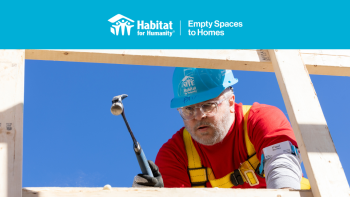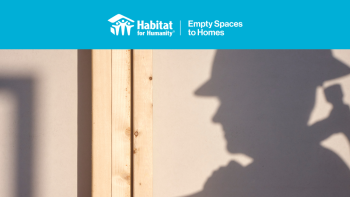Country Facts:
- Capital – Dublin / Belfast
- Population – (total) 7 million
- Life expectancy – 81 years
- Unemployment rate – 5 %
Find more country facts on: CIA The World Factbook – Ireland
Habitat Facts
Habitat started in Northern Ireland in 1994 and in the Republic of Ireland in 2002.
•Individuals served in FY23 – 67
Through repairs – 67
•Funds raised in FY23 – $393,572
•Volunteers mobilized in FY23 – 1,968
Habitat in Ireland
Habitat for Humanity Ireland works to bring people together from across communities to serve the most vulnerable, mobilising hundreds of volunteers as the hearts, hands and voices for our work locally and globally
Habitat directly tackles poverty through its network of Habitat ReStores. As they build sustainable communities, ReStores provide access to low-cost home improvement materials, employability training for people of all abilities and divert tons of material from landfill. Every year, 90,000 local people are supported through ReStore.
The House to Home program supports vulnerable people who have been at risk of homelessness to sustain their tenancies, thus helping them to make a house a home. Habitat also raises funds across Ireland to support long-term partner programs in some of the world’s poorest communities and engages local people to become advocates for safe shelter.
How Habitat addresses the need in Ireland
Habitat ReStore
Six ReStores across Ireland demonstrate significant and sustainable impact for local people and the wider community. More than 150 volunteers invest 3,500 hours every month helping low-income families access low-cost home improvement materials. Every year, ReStore supports 25 people into employment, serves 90,000 local people, rescues 250 kitchens and diverts 1,500 tons of reusable material from landfill, thus protecting the environment.
House to Home program
The House to Home program supports vulnerable people who have been at risk of homelessness to sustain their tenancies, thus helping them to make a house a home. This includes redecoration, light-touch repairs or support with furniture through ReStore. The program also provides a platform for volunteer engagement locally.
Accredited training through ReStore
Habitat Ireland is offering free, practical and accessible courses to support local people. The courses, which are accredited through the Open College Network Northern Ireland, enable participants to learn the skills needed to thrive in retail, improve employability or take some time to think about their personal wellbeing and building resilience.
International partnerships
Globally, Habitat’s partnerships focus on strategic themes of peace building, disaster response and mitigation, vulnerable groups, and the impacts of urbanization. These partnerships support Habitat’s everyday work in Ethiopia, Cambodia, Malawi, Zambia, India and Romania. Support from across Ireland also contributes to Habitat’s response to disasters around the world including in Ukraine and bordering countries, Haiti, Nepal and Sri Lanka.
Global Village volunteer program
Volunteers from across Ireland travel in support of long-term partnerships, working alongside families and communities to help build or improve homes. Volunteers also support water, sanitation and hygiene interventions, learn about Habitat’s mission and speak out about the global need for safe shelter.
What you can do
DONATE
Donations designated to Ireland support local and long-term international partner programs. habitat.org/donate
VOLUNTEER
There are opportunities to volunteer at Habitat ReStore, at events, on-site locally, or globally, supporting Habitat’s long-term partner programs.
CONTACT
Email: [email protected]
Phone:
- Lisburn office +44 28 92 635 635
- Dublin office +353 1 531 0033
Website: www.habitatireland.org



